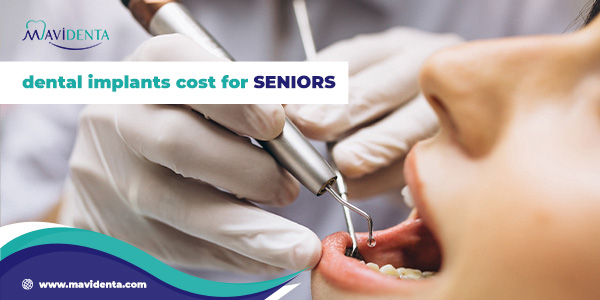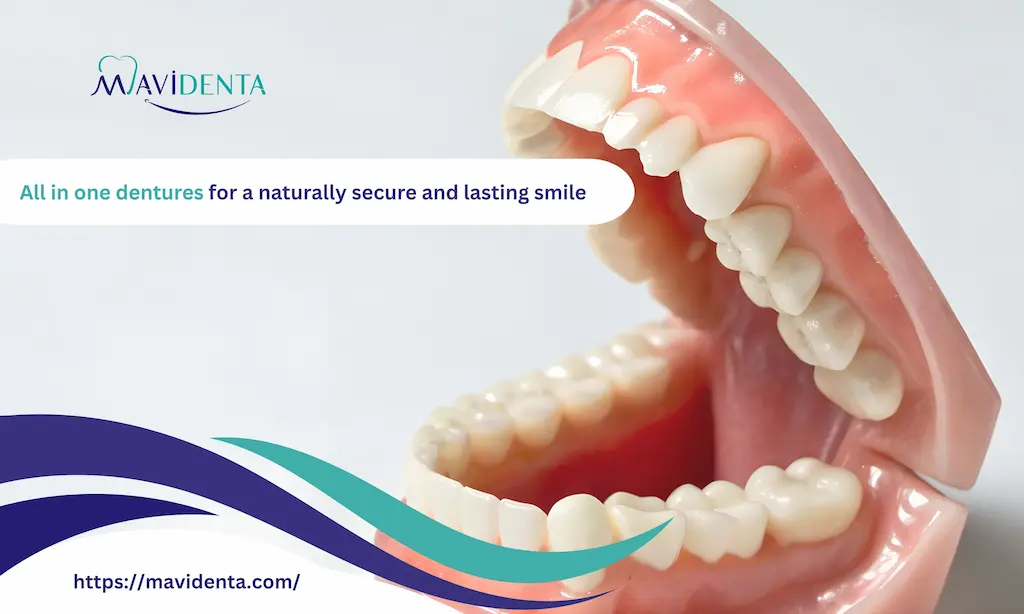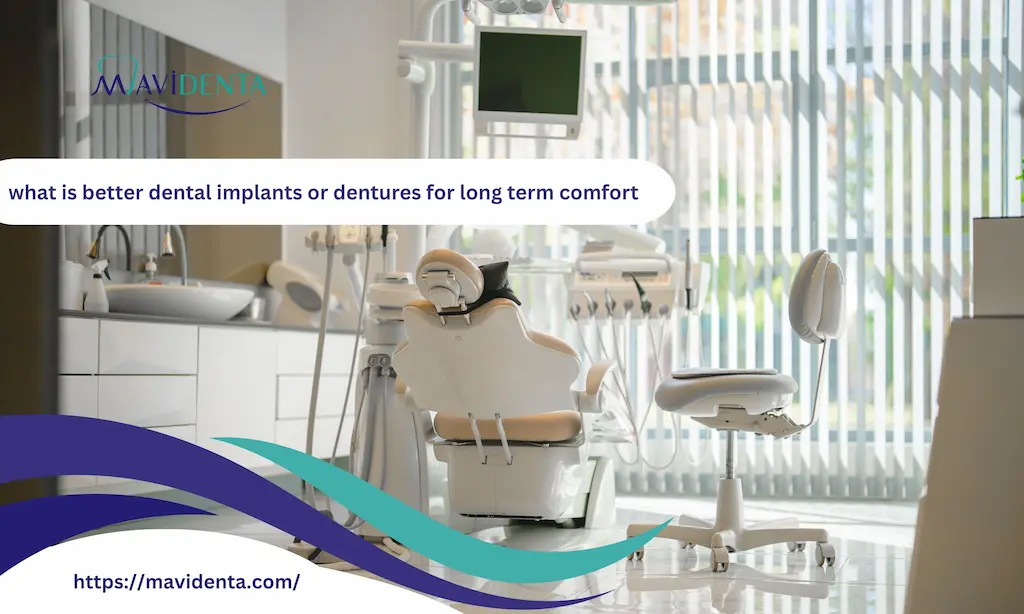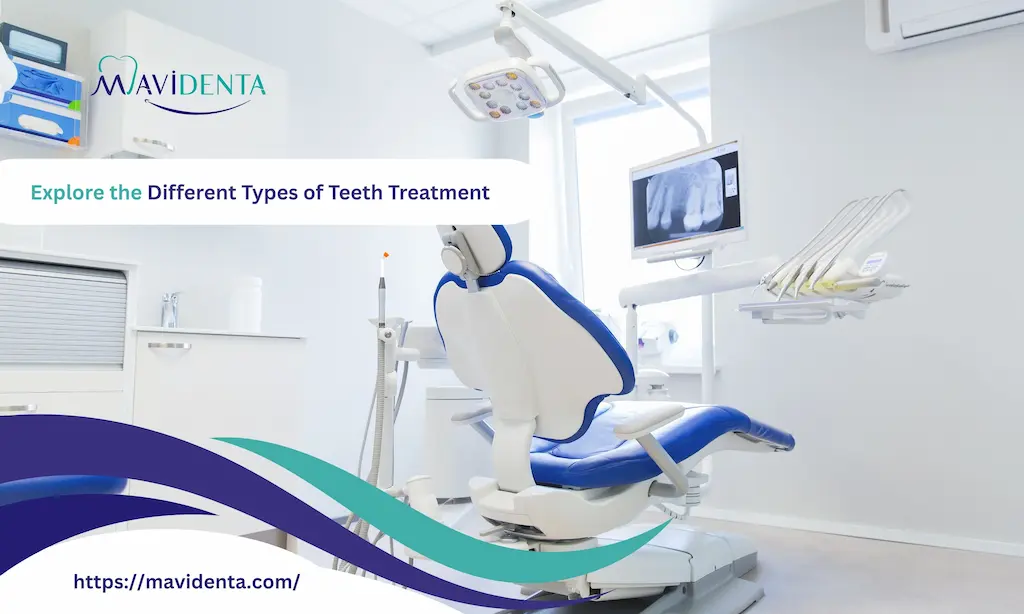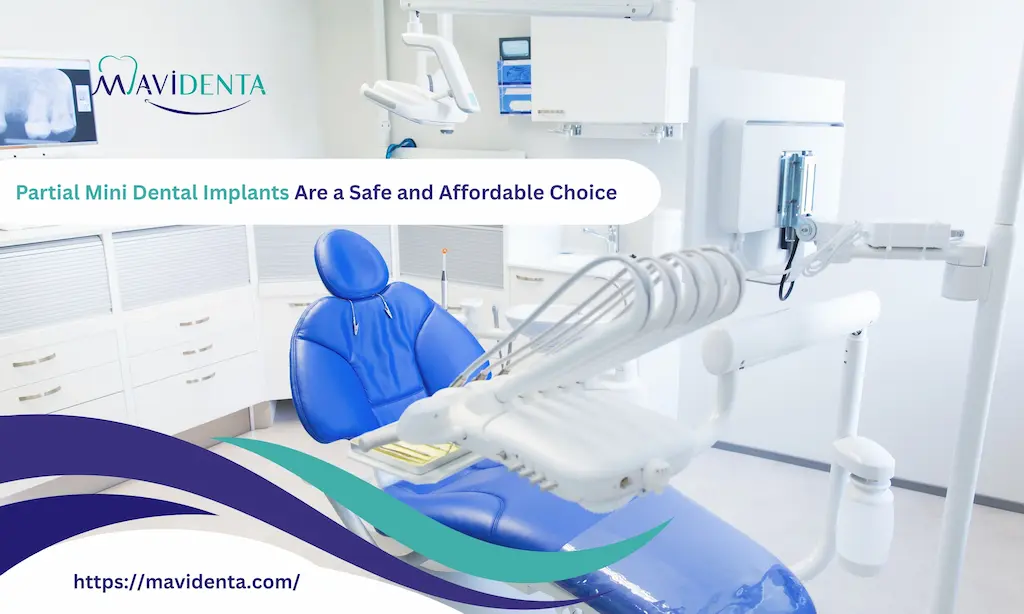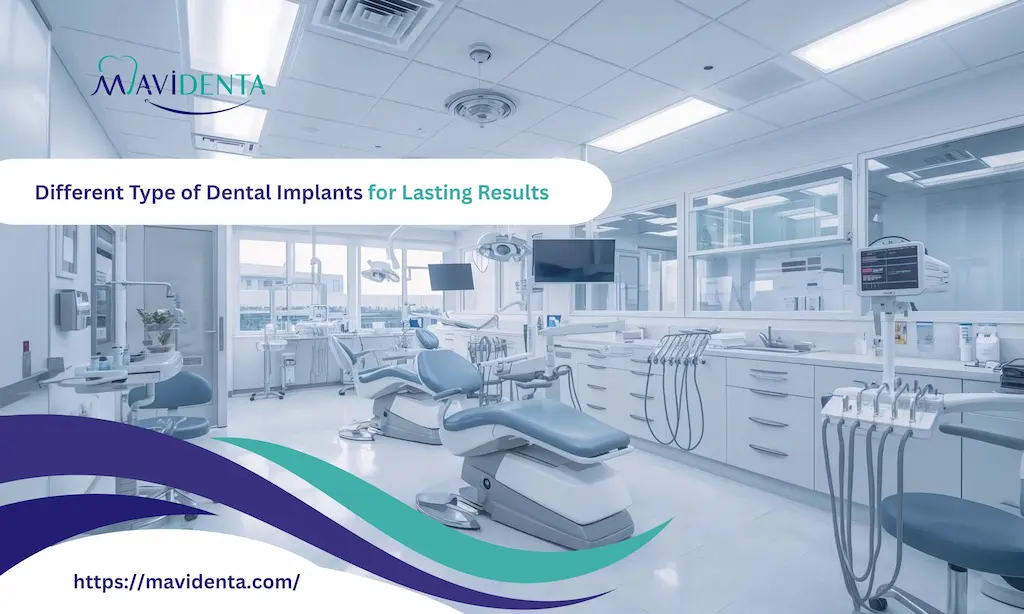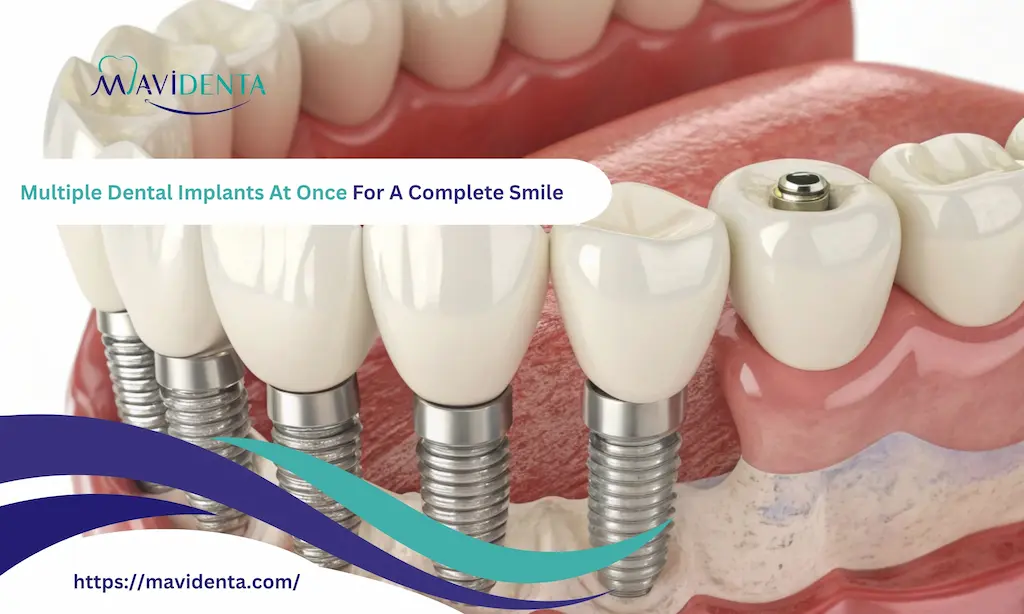Dental implants cost for seniors have become one of the matters that is being discussed recently among dentists. From installing full dentures to dental implants, these have become the options available to the elderly who lose their teeth with age. Dental implants cost for seniors have advantages superior to installing full dentures. It also has a high success rate and is very safe, rarely resulting in complications or potential risks.
What is the best age for dental implants?
Tooth loss is one of the common problems that result in many difficulties in a person’s life. Therefore, many people resort either to dental implants or to one of the alternatives to dental implants.
Forget what you think you know about age limitations for dental implants! Seniors can reap excellent benefits from this tooth replacement option. Dental implants can be a fantastic investment in your well-being as long as you’re in good overall health. Implants improve chewing function, giving you back the joy of various foods. They also boost confidence with a natural-looking smile that feels secure and stable. So, if you’re a senior looking to revitalize your oral health and enjoy a better quality of life, don’t hesitate to explore the possibility of dental implants!
Dental Implants for Seniors are performed by installing medical screws known as grafts in the jaw bones, which fuse after a short period with the jaw bones; after implantation appear in the same appearance as natural teeth and have the same durability and stability as natural teeth.
This surgery is considered one of the safe solutions for treating tooth loss in the elderly. It is a standard solution with a 95% success rate and rarely results in problems or complications.
Explore the Best Dental Implant Clinic in Istanbul.
Are dental implants safe for seniors?
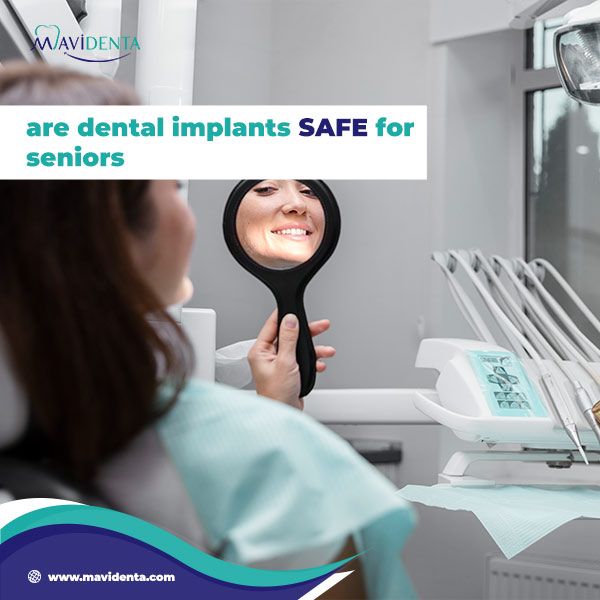
Under normal circumstances, there are no obstacles to Dental Implants for Seniors, and age does not represent any problem. This operation has been performed on people in their eighties and nineties, except that the person’s exposure to some health problems may hinder the procedure of this implant or require prior procedures before performing the surgery. This is like:
Gum disease:
This is due to the possibility of infection and the poor ability of the gums to recover after the procedure.
Heart disease:
Heart disease may affect the success rate of the procedure due to its effect on the ability of the gums to heal and the ability of the bone to grow and fuse with the implanted tooth.
Type 1 diabetes:
High blood sugar affects the ability of tissues to heal, so blood sugar levels must be controlled before surgery to avoid bleeding after surgery.
Some types of medications, such as depression medications:
Some medications may affect bone growth, affecting the operation’s success rate because the implant is not stable well. Therefore, you must inform the doctor of your medications before operating.
Lack of sufficient jaw bone:
The stabilization of the implanted tooth depends on the presence of a sufficient amount of jaw bone, so the doctor may advise implanting jaw bones first before dental implants if the jaw bones deteriorate and are not suitable for implantation.
Advantages of dental implants for the elderly:-
It is worth noting that affordable dental implants for seniors and older people have many features, which are distinguished in the following points:
- It lasts for long periods of up to 25 years or more.
- The person can eat normally, and they have the appearance of natural teeth.
- It keeps the jaw bones from decaying and decomposing after teeth fall out and also stimulates the growth of the jaw bones.
- It stays in place and is cleaned naturally, unlike dentures, which require removal now and then to be cleaned and are not stable.
While dental implants offer numerous advantages, it’s important to consider dental implants cost for seniors to make an informed decision.
Disadvantages of dental implants for the elderly:-
In contrast to the advantages of Dental Implants for Seniors, there are some disadvantages that the patient may face, such as:
- High cost: Dental implants cost for seniors can be a significant factor to consider.
- It also takes months for the graft to fuse with the jawbone.
- Dental Implants for Seniors depend on the presence of an appropriate amount of jaw bone for the implant, which sometimes requires a jaw bone implant first.
- In some people, the gums may appear gray or black when looking at the part of the implanted graft if the gum tissue is thin.
Read more: Can You Get Dental Implants If You Have No Teeth.
Possible risks after dental implants for the elderly:-
Although dental implants for seniors are very successful operations, they contain some risks, which, although rare, are still possible, which are:
Nerve damage:
During Dental Implants for Seniors, it is possible for the doctor to hit a nerve accidentally or for the implant location to be very close to one of the nerves in that area, which requires precision during the procedure.
Transplant failure:
The reason for failure is often the body’s inability to heal the wound after the operation due to immune diseases, heart disease, and other problems.
Fracture of the implanted tooth:
The implanted tooth may break, which may result from choosing inappropriate sizes for the implant location or the patient not following the doctor’s instructions.
Sinus problems:
After the operation, the patient may suffer sinus problems when dental implants are placed in the upper jaw.
If you’re considering dental implants, consulting with a dentist to discuss dental implants cost for seniors and any potential risks is crucial.
Read more: The Best Places That Do Dental Implants.
Is 70 too old for dental implants?
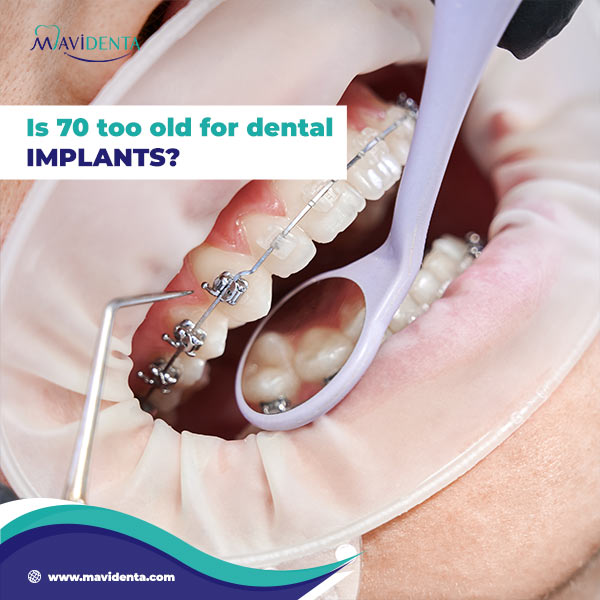
Is 70 too old for dental implants?
For example, the age at which the transplant is done is another important criterion. General health status is a more important factor than age. The risks of dental screw surgery for many people in their 70s and 80s are lower than the risks of dental surgery for younger people who have health problems.
As tooth losses increase, the need for implants is more significant in older individuals than in younger ones. Therefore, the implant application rate for older adults is much higher than that of young people.
In addition, a person should undergo implant treatment when his health is good and not wait long years for implant treatment. Patients with systemic diseases who receive regular medications should consult a specialist.
Want to know about dental implants suitable for seniors?
The steps for affordable dental implants for seniors are as follows:
- The doctor first examines the area in which the operation is to be performed. He also requests X-rays of the jaw (panoramic X-ray), takes measurements of the jaw, and makes a template that fits the jaw sizes.
- In some cases, the doctor needs a CT scan to help him evaluate the health and percentage of bone in the transplant area.
- The doctor ensures the patient is fit for the transplant and develops an appropriate treatment plan.
- The doctor extracts the broken tooth or tooth or a remaining root.
- The doctor uses local anesthesia for the patient so that he does not feel pain during all steps of the dental implant process, from extraction to installation.
- The doctor prescribes sedative and pain-relieving medications so that the patient feels comfortable.
- The doctor makes a small cut in the gum so that he can reach a deep part of the bone.
- The doctor places the implant, made of titanium metal, inside the bone using special tools and drills.
- The doctor places a cover on the implant. The cover helps the bone and gum tissue fuse with the implant. It also protects the upper part of the implant from the accumulation of tartar and food residues.
Read more: Dental Implants Cost Per Tooth.
What factors affect the dental implants cost for seniors?
While dental implants are a fantastic option for seniors to regain a healthy smile and improve chewing, it’s essential to understand that the cost can vary depending on individual needs. Several factors influence the final price, so consulting with a dental professional is key. They can assess your situation and create a personalized treatment plan outlining the associated costs.
You can contact us for a free consultation.
Ways to take care of oral and dental health for the elderly:-
For Dental Implant for Seniors, many ways help them maintain healthy gums free of disease, such as:
Conducting regular dental examinations:
It is essential for older people to visit the dentist regularly to conduct examinations and clean any formed tartar layer. If no problems appear during this period, we recommend repeating the visit every six months to identify any dental issues early and prevent them from deteriorating.
Oral hygiene:
Seniors should brush their teeth twice daily and use dental floss daily to remove plaque and food particles that can cause cavities and gum disease. Antiseptic mouthwash can also kill bacteria in the mouth.
Caring for removable dentures:
For those who wear dentures, it is essential to clean them daily and correctly. The dentures must be removed and soaked overnight to prevent the growth of bacteria and kept moist to prevent deformation of their size or shape or even breakage of any part of them.
Healthy diet:
A balanced diet rich in vitamins and minerals can help maintain good oral health, and avoiding sugary and acidic foods and drinks can help prevent tooth decay and erosion.
Fluoride treatments:
Fluoride treatments can help prevent tooth decay by strengthening tooth enamel, and older adults can benefit from fluoride treatments to help protect their teeth.
Medication review:
Some medications can cause dry mouth, increasing your risk of tooth decay and gum disease. A medication review helps your doctor and dentist identify any potential problems.
Use dental floss:
Dental floss helps clean the spaces between the teeth from food debris and other plankton. Older people can use dental floss or water floss to clean these spaces.
Cleaning teeth daily:
Daily tooth cleaning is the cornerstone of all dental care, and being elderly is no exception to the rule. However, some older adults need help brushing their teeth if they are having difficulty doing so.
Quit Smoking:
Smoking is very harmful to dental health and is primarily responsible for inflammation and receding gums, oral cancer, tooth decay, and many others. Therefore, it is essential for older people and young people at the same time to quit smoking once and for all to preserve their teeth.
Avoid foods and drinks that contain a lot of sugar:
Sugars considerably harm dental health, especially among the elderly, who are more susceptible to dental disease. Therefore, they must avoid foods and drinks rich in sugars, follow a diet rich in calcium and beneficial fats instead of sugars, and increase the amount of vegetables in their diet.
Read more: How To Get Dental Implants Without Insurance
Diagnosing dental diseases related to aging:-
In addition to affordable dental implants for seniors, teeth have diseases that result from aging and aging. These are diseases that the senior dentist specializes in treating and diagnosing age-related diseases based on what he studies in general dentistry and geriatric dentistry.
Loss of bone support for teeth in the elderly:
It is known that bones undergo many changes with age. After a certain age, bones gradually lose their density and strength, and the jaw bones holding and supporting teeth are no exception. Loss of bone support for teeth is a common disease in the elderly.
Tooth decay in the elderly:
Tooth decay in older people occurs due to the natural deterioration of tooth enamel with age, leaving the following layers of teeth unprotected.
Stomatitis due to dentures in the elderly:
Stomatitis due to dentures is a condition caused by a fungal infection with Candida fungi in the mouth. Stomatitis in older people affects older adults who wear dentures due to constant removal.
Gum diseases and problems in the elderly:
The most common gum diseases in the elderly are receding gums from the teeth and gingivitis. Gingivitis occurs when bacteria and plaque accumulate where the teeth meet the gums.
Dry mouth in the elderly:
Dry mouth affects many older adults due to their decreased saliva secretion, which is one of the factors responsible for tooth decay in older people. Dry mouth is not a symptom of aging but a side effect of some medications the elderly use, such as allergies, asthma, high blood pressure medications, and others.
Oral cancer in adults:
The probability of developing oral cancer increases with age, and smokers and alcoholic drinkers are more susceptible to developing oral cancer in adults than others.
Conclusion
At the conclusion of the text, Dental Implants for Seniors are one of the prosthetic methods that help them live their lives normally. Therefore, Mavidenta provides dental implant services, regardless of your age. If your physical health is good, then you are certainly a welcome guest to perform dental implants. Schedule a free consultation today to discuss your options and see if dental implants are right for you!
FAQS
Do dental implants for seniors hurt more than dentures?
Not necessarily. With modern anesthesia and advanced techniques, dental implant surgery is generally painless during the procedure. Post-surgery discomfort is usually mild and manageable compared to the long-term discomfort many face with loose dentures.
How long do dental implants last for seniors?
Dental implants are designed to last 20–25 years or more, and in many cases a lifetime, provided seniors maintain good oral hygiene and attend regular dental check-ups.
Are dental implants worth the cost for seniors?
Yes, for many seniors they are a long-term investment. Unlike dentures, implants prevent bone loss, improve chewing ability, and provide a stable, natural-looking smile. While the cost may be higher upfront, implants save money over time compared to repeated denture replacements.
Can seniors with existing health problems still get implants?
It depends on the condition. Controlled diabetes or heart disease may not be a barrier, but uncontrolled health issues, insufficient bone density, or certain medications could require additional treatments such as bone grafting or medical clearance first.
Do dental implants look natural for elderly patients?
Absolutely. Implants are designed to blend seamlessly with natural teeth in color, size, and shape. Most people will not be able to tell the difference between implants and natural teeth.

